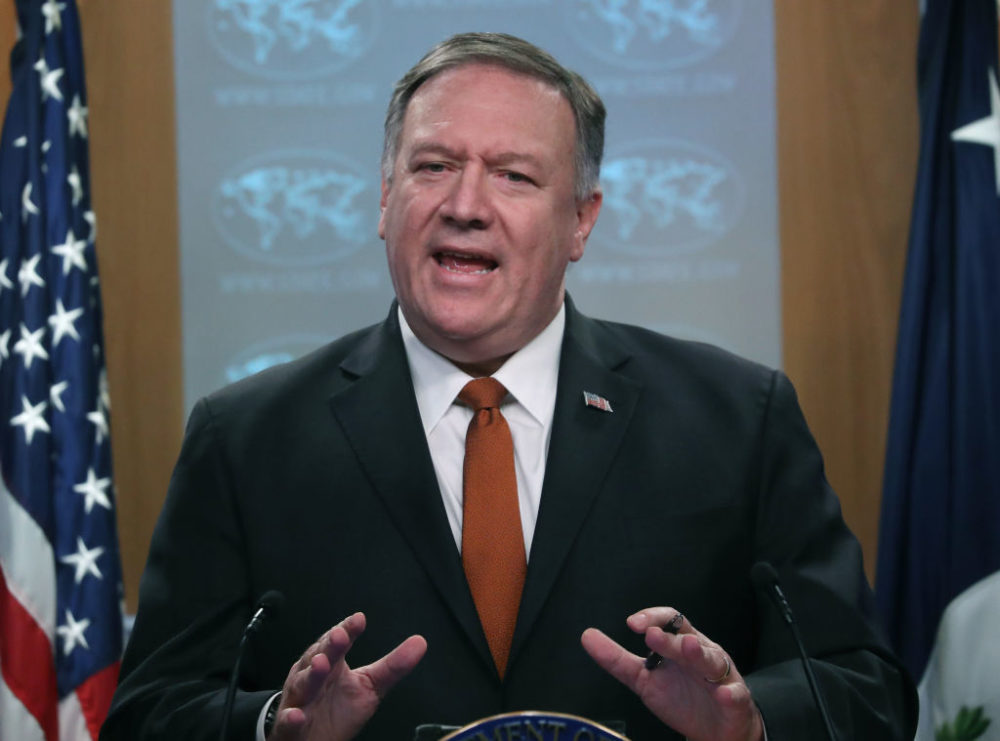The Boston Blobe
Secretary of State Michael Pompeo has recommended that the U.S. keep funding World Health Organization programs to fight polio and coronavirus in seven countries, a recognition that the group provides key services in some areas despite President Donald Trump’s criticism.
State Department officials informed the National Security Council that the WHO is central to the fight against Covid-19 or polio in seven countries: Afghanistan, Egypt, Libya, Pakistan, Sudan, Syria and Turkey, said a person familiar with the discussions. Adhering to the letter of Trump’s order from last week to halt all U.S. funding to WHO for a 60- to 90-day review would therefore be unworkable.
In the case of Afghanistan and Pakistan, the programs at stake are for fighting polio and coronavirus, while for the other five, it’s only for work on coronavirus.
Pompeo’s recommendation reflects the reality that no other group has the infrastructure or relationship with local governments to get the job done in those places, the person said.
In Turkey, for example, the issue is access to refugees and other migrants, as well as supplies of protective gear to fight the coronavirus.
On April 14, Trump announced he was directing his administration to halt WHO funding pending a review into what he said was the organization’s “role in severely mismanaging and covering up the spread of the coronavirus.”
The U.S. pays $400 million to $500 million a year to the Geneva-based group, but believes that China, which pays only a fraction of that amount, has become too influential over the decisions of the organization and its director general, Tedros Adhanom Ghebreyesus.
Pompeo’s recommendations are an acknowledgment that for all of the concern surrounding the WHO, a blanket ban would run counter to U.S. national security interests in fighting the virus and containing polio globally. The U.S. is a key funder of the group’s polio programs and contributed more than double the second-largest contributor in 2019.
Trump’s order set off a heated debate within the administration, with some officials at the State Department and other agencies arguing that a funding cut to the WHO would only hinder the fight against coronavirus and delay other critical programs. Officials at the White House’s Office of Management and Budget, however, argued that the money should be permanently sent elsewhere.
Spokespeople at the State Department and OMB declined to comment on Friday; NSC didn’t respond to a request for comment. But another administration official said the discussion over exemptions was ongoing and acknowledged a difference in opinion between the various agencies.
Indeed, the U.S. order is also getting pushback from dozens of countries, which are eager for American funding but are accustomed to working closely with the WHO, according to the person familiar with the deliberations. U.S. officials agree with this to an extent, although they believe other groups could fill the gap if needed.
“There are a lot of things that WHO does really well and I would put Covid in that category,” said Jeremy Konyndyk, senior policy fellow at the Center for Global Development, who served in the Obama administration. “We can’t begin to replace the work that they’re going to do to combat it in the developing world.”
On April 22, the acting director for the U.S. Agency for International Development, John Barsa, declined to answer a reporter’s question about whether Trump’s pause on WHO funding would include carve-outs for certain programs, including polio vaccinations.
Pompeo has given contradictory signals about U.S support for the WHO. In a March 31 briefing, he said Americans should be “aware of and proud of our vast commitments to these important institutions,” including the WHO. Yet he’s taken a harsher public tone in the days since, suggesting that Tedros may need to resign and that U.S. funding might never return.
“We need a structural fix for the WHO,” Pompeo said April 22 on the “Ingraham Angle” on Fox News, later adding, “it may be the case that the United States can never return to underwriting, having U.S. taxpayer dollars go to, the WHO.






